T3 2019 HA3011 Advanced Financial Accounting Report
VerifiedAdded on 2022/08/26
|7
|2741
|16
Report
AI Summary
This report examines advanced financial accounting principles, specifically focusing on the reporting entity concept and fundamental qualitative characteristics. The report begins by defining a reporting entity and discussing the criteria for identifying one, using Beach Energy Limited as a case study. It analyzes Beach Energy based on factors such as separation of ownership and management, economic influence, and financial characteristics, concluding that it qualifies as a reporting entity. The report then delves into the fundamental qualitative characteristics of financial information: relevance and representational faithfulness. It explains the importance of these characteristics in accounting for assets and liabilities, providing examples related to Beach Energy's petroleum assets and payables. The analysis emphasizes the equal importance of both relevance and representational faithfulness for financial information to be useful, concluding that both are essential for effective decision-making by users of financial statements. The report adheres to the guidelines of the Holmes Institute's HA3011 Advanced Financial Accounting course, addressing specific learning outcomes related to financial reporting and accounting standards.

Running head: ADVANCED FINANCIAL ACCOUNTING
Advanced Financial Accounting
Name of the Student
Name of the University
Author’s Note
Advanced Financial Accounting
Name of the Student
Name of the University
Author’s Note
Paraphrase This Document
Need a fresh take? Get an instant paraphrase of this document with our AI Paraphraser
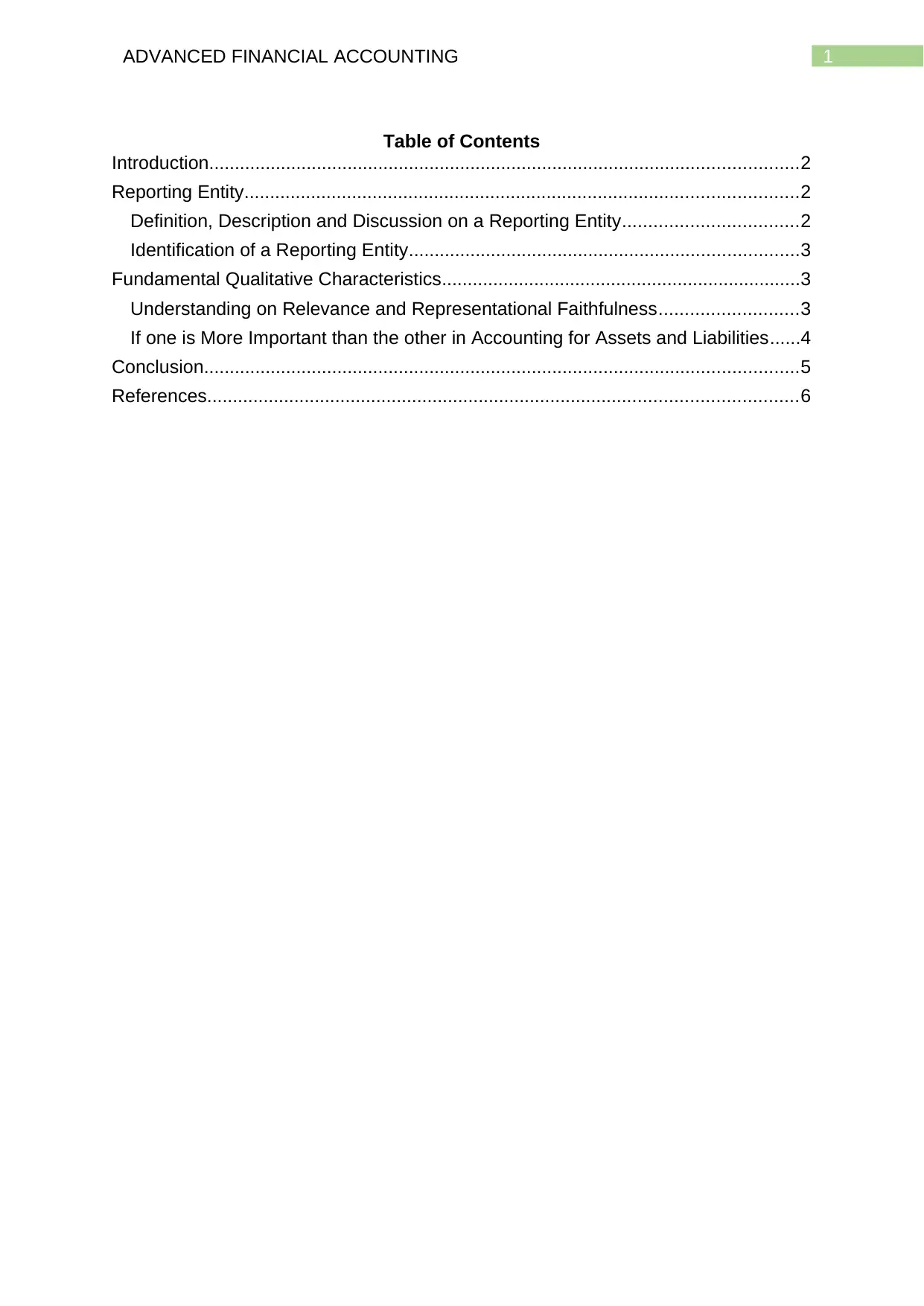
1ADVANCED FINANCIAL ACCOUNTING
Table of Contents
Introduction...................................................................................................................2
Reporting Entity............................................................................................................2
Definition, Description and Discussion on a Reporting Entity..................................2
Identification of a Reporting Entity............................................................................3
Fundamental Qualitative Characteristics......................................................................3
Understanding on Relevance and Representational Faithfulness...........................3
If one is More Important than the other in Accounting for Assets and Liabilities......4
Conclusion....................................................................................................................5
References...................................................................................................................6
Table of Contents
Introduction...................................................................................................................2
Reporting Entity............................................................................................................2
Definition, Description and Discussion on a Reporting Entity..................................2
Identification of a Reporting Entity............................................................................3
Fundamental Qualitative Characteristics......................................................................3
Understanding on Relevance and Representational Faithfulness...........................3
If one is More Important than the other in Accounting for Assets and Liabilities......4
Conclusion....................................................................................................................5
References...................................................................................................................6
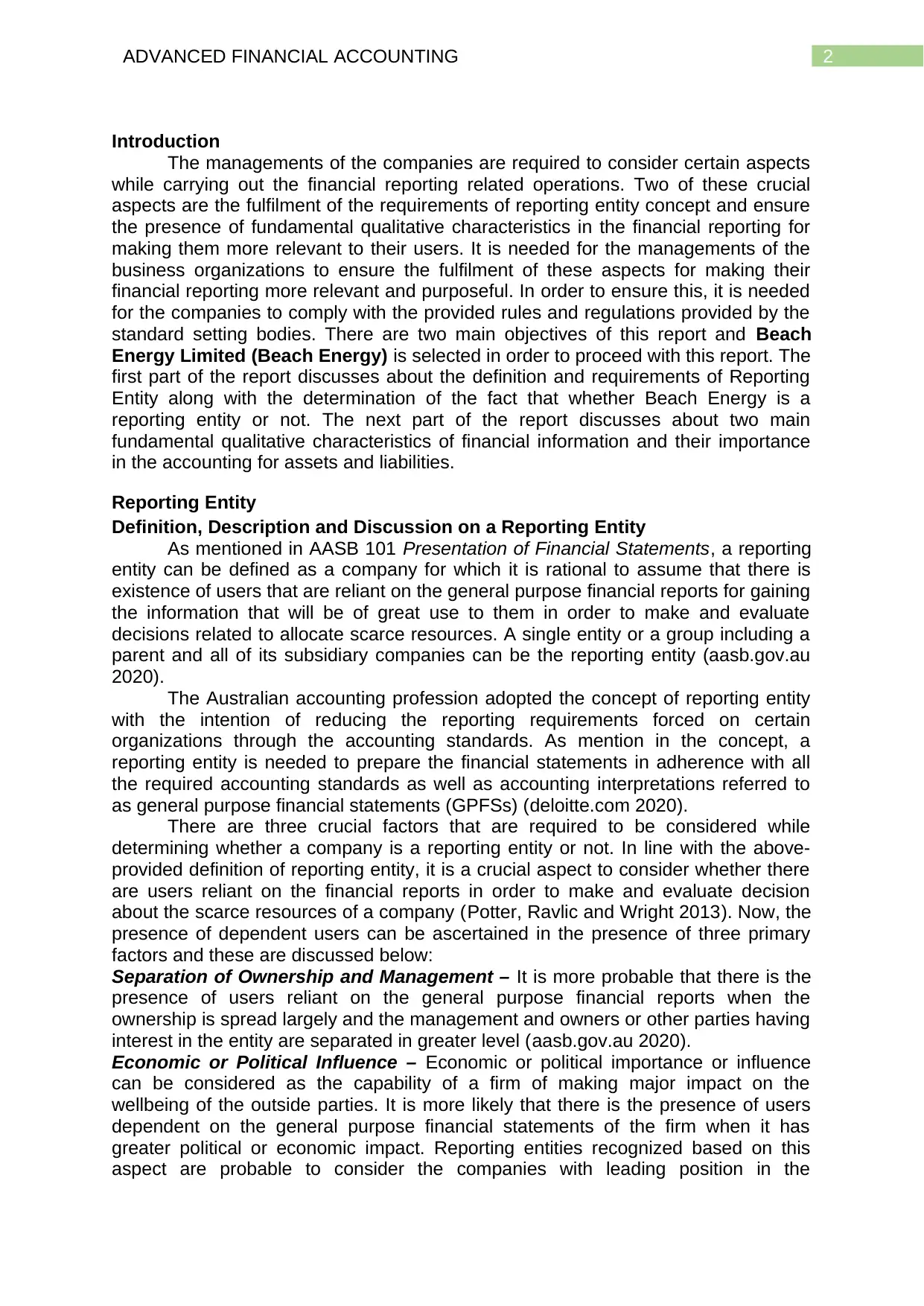
2ADVANCED FINANCIAL ACCOUNTING
Introduction
The managements of the companies are required to consider certain aspects
while carrying out the financial reporting related operations. Two of these crucial
aspects are the fulfilment of the requirements of reporting entity concept and ensure
the presence of fundamental qualitative characteristics in the financial reporting for
making them more relevant to their users. It is needed for the managements of the
business organizations to ensure the fulfilment of these aspects for making their
financial reporting more relevant and purposeful. In order to ensure this, it is needed
for the companies to comply with the provided rules and regulations provided by the
standard setting bodies. There are two main objectives of this report and Beach
Energy Limited (Beach Energy) is selected in order to proceed with this report. The
first part of the report discusses about the definition and requirements of Reporting
Entity along with the determination of the fact that whether Beach Energy is a
reporting entity or not. The next part of the report discusses about two main
fundamental qualitative characteristics of financial information and their importance
in the accounting for assets and liabilities.
Reporting Entity
Definition, Description and Discussion on a Reporting Entity
As mentioned in AASB 101 Presentation of Financial Statements, a reporting
entity can be defined as a company for which it is rational to assume that there is
existence of users that are reliant on the general purpose financial reports for gaining
the information that will be of great use to them in order to make and evaluate
decisions related to allocate scarce resources. A single entity or a group including a
parent and all of its subsidiary companies can be the reporting entity (aasb.gov.au
2020).
The Australian accounting profession adopted the concept of reporting entity
with the intention of reducing the reporting requirements forced on certain
organizations through the accounting standards. As mention in the concept, a
reporting entity is needed to prepare the financial statements in adherence with all
the required accounting standards as well as accounting interpretations referred to
as general purpose financial statements (GPFSs) (deloitte.com 2020).
There are three crucial factors that are required to be considered while
determining whether a company is a reporting entity or not. In line with the above-
provided definition of reporting entity, it is a crucial aspect to consider whether there
are users reliant on the financial reports in order to make and evaluate decision
about the scarce resources of a company (Potter, Ravlic and Wright 2013). Now, the
presence of dependent users can be ascertained in the presence of three primary
factors and these are discussed below:
Separation of Ownership and Management – It is more probable that there is the
presence of users reliant on the general purpose financial reports when the
ownership is spread largely and the management and owners or other parties having
interest in the entity are separated in greater level (aasb.gov.au 2020).
Economic or Political Influence – Economic or political importance or influence
can be considered as the capability of a firm of making major impact on the
wellbeing of the outside parties. It is more likely that there is the presence of users
dependent on the general purpose financial statements of the firm when it has
greater political or economic impact. Reporting entities recognized based on this
aspect are probable to consider the companies with leading position in the
Introduction
The managements of the companies are required to consider certain aspects
while carrying out the financial reporting related operations. Two of these crucial
aspects are the fulfilment of the requirements of reporting entity concept and ensure
the presence of fundamental qualitative characteristics in the financial reporting for
making them more relevant to their users. It is needed for the managements of the
business organizations to ensure the fulfilment of these aspects for making their
financial reporting more relevant and purposeful. In order to ensure this, it is needed
for the companies to comply with the provided rules and regulations provided by the
standard setting bodies. There are two main objectives of this report and Beach
Energy Limited (Beach Energy) is selected in order to proceed with this report. The
first part of the report discusses about the definition and requirements of Reporting
Entity along with the determination of the fact that whether Beach Energy is a
reporting entity or not. The next part of the report discusses about two main
fundamental qualitative characteristics of financial information and their importance
in the accounting for assets and liabilities.
Reporting Entity
Definition, Description and Discussion on a Reporting Entity
As mentioned in AASB 101 Presentation of Financial Statements, a reporting
entity can be defined as a company for which it is rational to assume that there is
existence of users that are reliant on the general purpose financial reports for gaining
the information that will be of great use to them in order to make and evaluate
decisions related to allocate scarce resources. A single entity or a group including a
parent and all of its subsidiary companies can be the reporting entity (aasb.gov.au
2020).
The Australian accounting profession adopted the concept of reporting entity
with the intention of reducing the reporting requirements forced on certain
organizations through the accounting standards. As mention in the concept, a
reporting entity is needed to prepare the financial statements in adherence with all
the required accounting standards as well as accounting interpretations referred to
as general purpose financial statements (GPFSs) (deloitte.com 2020).
There are three crucial factors that are required to be considered while
determining whether a company is a reporting entity or not. In line with the above-
provided definition of reporting entity, it is a crucial aspect to consider whether there
are users reliant on the financial reports in order to make and evaluate decision
about the scarce resources of a company (Potter, Ravlic and Wright 2013). Now, the
presence of dependent users can be ascertained in the presence of three primary
factors and these are discussed below:
Separation of Ownership and Management – It is more probable that there is the
presence of users reliant on the general purpose financial reports when the
ownership is spread largely and the management and owners or other parties having
interest in the entity are separated in greater level (aasb.gov.au 2020).
Economic or Political Influence – Economic or political importance or influence
can be considered as the capability of a firm of making major impact on the
wellbeing of the outside parties. It is more likely that there is the presence of users
dependent on the general purpose financial statements of the firm when it has
greater political or economic impact. Reporting entities recognized based on this
aspect are probable to consider the companies with leading position in the
⊘ This is a preview!⊘
Do you want full access?
Subscribe today to unlock all pages.

Trusted by 1+ million students worldwide
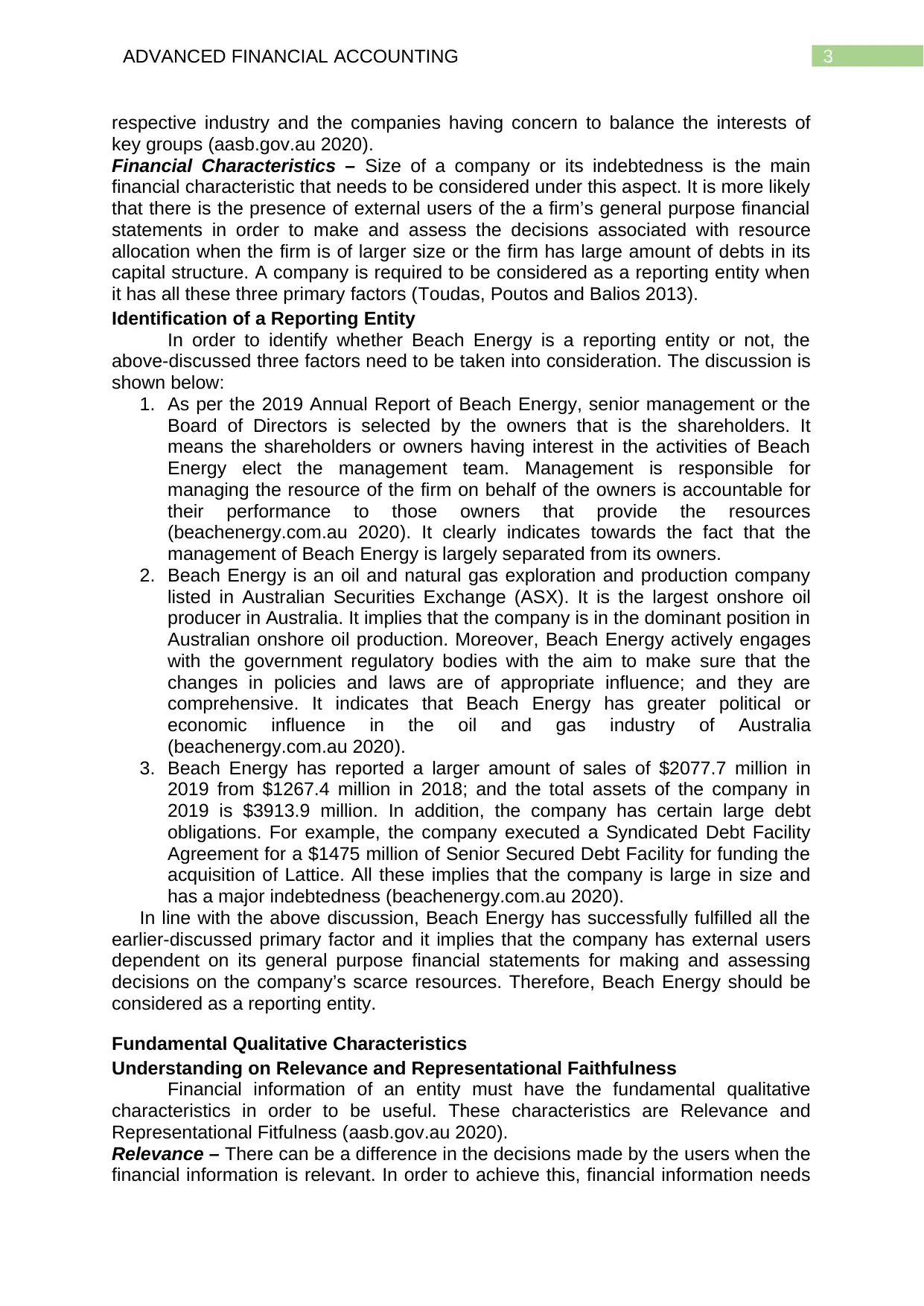
3ADVANCED FINANCIAL ACCOUNTING
respective industry and the companies having concern to balance the interests of
key groups (aasb.gov.au 2020).
Financial Characteristics – Size of a company or its indebtedness is the main
financial characteristic that needs to be considered under this aspect. It is more likely
that there is the presence of external users of the a firm’s general purpose financial
statements in order to make and assess the decisions associated with resource
allocation when the firm is of larger size or the firm has large amount of debts in its
capital structure. A company is required to be considered as a reporting entity when
it has all these three primary factors (Toudas, Poutos and Balios 2013).
Identification of a Reporting Entity
In order to identify whether Beach Energy is a reporting entity or not, the
above-discussed three factors need to be taken into consideration. The discussion is
shown below:
1. As per the 2019 Annual Report of Beach Energy, senior management or the
Board of Directors is selected by the owners that is the shareholders. It
means the shareholders or owners having interest in the activities of Beach
Energy elect the management team. Management is responsible for
managing the resource of the firm on behalf of the owners is accountable for
their performance to those owners that provide the resources
(beachenergy.com.au 2020). It clearly indicates towards the fact that the
management of Beach Energy is largely separated from its owners.
2. Beach Energy is an oil and natural gas exploration and production company
listed in Australian Securities Exchange (ASX). It is the largest onshore oil
producer in Australia. It implies that the company is in the dominant position in
Australian onshore oil production. Moreover, Beach Energy actively engages
with the government regulatory bodies with the aim to make sure that the
changes in policies and laws are of appropriate influence; and they are
comprehensive. It indicates that Beach Energy has greater political or
economic influence in the oil and gas industry of Australia
(beachenergy.com.au 2020).
3. Beach Energy has reported a larger amount of sales of $2077.7 million in
2019 from $1267.4 million in 2018; and the total assets of the company in
2019 is $3913.9 million. In addition, the company has certain large debt
obligations. For example, the company executed a Syndicated Debt Facility
Agreement for a $1475 million of Senior Secured Debt Facility for funding the
acquisition of Lattice. All these implies that the company is large in size and
has a major indebtedness (beachenergy.com.au 2020).
In line with the above discussion, Beach Energy has successfully fulfilled all the
earlier-discussed primary factor and it implies that the company has external users
dependent on its general purpose financial statements for making and assessing
decisions on the company’s scarce resources. Therefore, Beach Energy should be
considered as a reporting entity.
Fundamental Qualitative Characteristics
Understanding on Relevance and Representational Faithfulness
Financial information of an entity must have the fundamental qualitative
characteristics in order to be useful. These characteristics are Relevance and
Representational Fitfulness (aasb.gov.au 2020).
Relevance – There can be a difference in the decisions made by the users when the
financial information is relevant. In order to achieve this, financial information needs
respective industry and the companies having concern to balance the interests of
key groups (aasb.gov.au 2020).
Financial Characteristics – Size of a company or its indebtedness is the main
financial characteristic that needs to be considered under this aspect. It is more likely
that there is the presence of external users of the a firm’s general purpose financial
statements in order to make and assess the decisions associated with resource
allocation when the firm is of larger size or the firm has large amount of debts in its
capital structure. A company is required to be considered as a reporting entity when
it has all these three primary factors (Toudas, Poutos and Balios 2013).
Identification of a Reporting Entity
In order to identify whether Beach Energy is a reporting entity or not, the
above-discussed three factors need to be taken into consideration. The discussion is
shown below:
1. As per the 2019 Annual Report of Beach Energy, senior management or the
Board of Directors is selected by the owners that is the shareholders. It
means the shareholders or owners having interest in the activities of Beach
Energy elect the management team. Management is responsible for
managing the resource of the firm on behalf of the owners is accountable for
their performance to those owners that provide the resources
(beachenergy.com.au 2020). It clearly indicates towards the fact that the
management of Beach Energy is largely separated from its owners.
2. Beach Energy is an oil and natural gas exploration and production company
listed in Australian Securities Exchange (ASX). It is the largest onshore oil
producer in Australia. It implies that the company is in the dominant position in
Australian onshore oil production. Moreover, Beach Energy actively engages
with the government regulatory bodies with the aim to make sure that the
changes in policies and laws are of appropriate influence; and they are
comprehensive. It indicates that Beach Energy has greater political or
economic influence in the oil and gas industry of Australia
(beachenergy.com.au 2020).
3. Beach Energy has reported a larger amount of sales of $2077.7 million in
2019 from $1267.4 million in 2018; and the total assets of the company in
2019 is $3913.9 million. In addition, the company has certain large debt
obligations. For example, the company executed a Syndicated Debt Facility
Agreement for a $1475 million of Senior Secured Debt Facility for funding the
acquisition of Lattice. All these implies that the company is large in size and
has a major indebtedness (beachenergy.com.au 2020).
In line with the above discussion, Beach Energy has successfully fulfilled all the
earlier-discussed primary factor and it implies that the company has external users
dependent on its general purpose financial statements for making and assessing
decisions on the company’s scarce resources. Therefore, Beach Energy should be
considered as a reporting entity.
Fundamental Qualitative Characteristics
Understanding on Relevance and Representational Faithfulness
Financial information of an entity must have the fundamental qualitative
characteristics in order to be useful. These characteristics are Relevance and
Representational Fitfulness (aasb.gov.au 2020).
Relevance – There can be a difference in the decisions made by the users when the
financial information is relevant. In order to achieve this, financial information needs
Paraphrase This Document
Need a fresh take? Get an instant paraphrase of this document with our AI Paraphraser
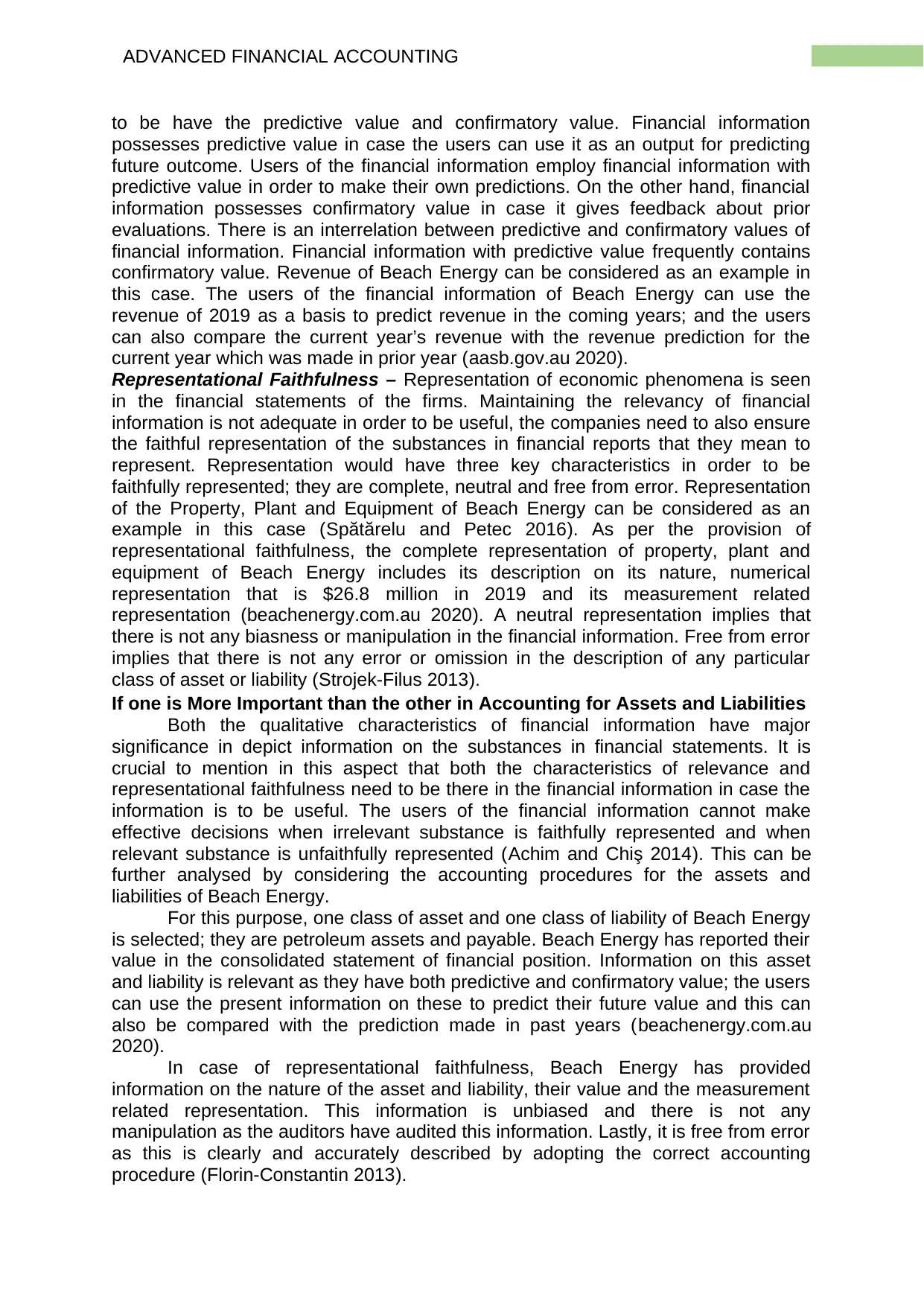
4ADVANCED FINANCIAL ACCOUNTING
to be have the predictive value and confirmatory value. Financial information
possesses predictive value in case the users can use it as an output for predicting
future outcome. Users of the financial information employ financial information with
predictive value in order to make their own predictions. On the other hand, financial
information possesses confirmatory value in case it gives feedback about prior
evaluations. There is an interrelation between predictive and confirmatory values of
financial information. Financial information with predictive value frequently contains
confirmatory value. Revenue of Beach Energy can be considered as an example in
this case. The users of the financial information of Beach Energy can use the
revenue of 2019 as a basis to predict revenue in the coming years; and the users
can also compare the current year’s revenue with the revenue prediction for the
current year which was made in prior year (aasb.gov.au 2020).
Representational Faithfulness – Representation of economic phenomena is seen
in the financial statements of the firms. Maintaining the relevancy of financial
information is not adequate in order to be useful, the companies need to also ensure
the faithful representation of the substances in financial reports that they mean to
represent. Representation would have three key characteristics in order to be
faithfully represented; they are complete, neutral and free from error. Representation
of the Property, Plant and Equipment of Beach Energy can be considered as an
example in this case (Spătărelu and Petec 2016). As per the provision of
representational faithfulness, the complete representation of property, plant and
equipment of Beach Energy includes its description on its nature, numerical
representation that is $26.8 million in 2019 and its measurement related
representation (beachenergy.com.au 2020). A neutral representation implies that
there is not any biasness or manipulation in the financial information. Free from error
implies that there is not any error or omission in the description of any particular
class of asset or liability (Strojek-Filus 2013).
If one is More Important than the other in Accounting for Assets and Liabilities
Both the qualitative characteristics of financial information have major
significance in depict information on the substances in financial statements. It is
crucial to mention in this aspect that both the characteristics of relevance and
representational faithfulness need to be there in the financial information in case the
information is to be useful. The users of the financial information cannot make
effective decisions when irrelevant substance is faithfully represented and when
relevant substance is unfaithfully represented (Achim and Chiş 2014). This can be
further analysed by considering the accounting procedures for the assets and
liabilities of Beach Energy.
For this purpose, one class of asset and one class of liability of Beach Energy
is selected; they are petroleum assets and payable. Beach Energy has reported their
value in the consolidated statement of financial position. Information on this asset
and liability is relevant as they have both predictive and confirmatory value; the users
can use the present information on these to predict their future value and this can
also be compared with the prediction made in past years (beachenergy.com.au
2020).
In case of representational faithfulness, Beach Energy has provided
information on the nature of the asset and liability, their value and the measurement
related representation. This information is unbiased and there is not any
manipulation as the auditors have audited this information. Lastly, it is free from error
as this is clearly and accurately described by adopting the correct accounting
procedure (Florin-Constantin 2013).
to be have the predictive value and confirmatory value. Financial information
possesses predictive value in case the users can use it as an output for predicting
future outcome. Users of the financial information employ financial information with
predictive value in order to make their own predictions. On the other hand, financial
information possesses confirmatory value in case it gives feedback about prior
evaluations. There is an interrelation between predictive and confirmatory values of
financial information. Financial information with predictive value frequently contains
confirmatory value. Revenue of Beach Energy can be considered as an example in
this case. The users of the financial information of Beach Energy can use the
revenue of 2019 as a basis to predict revenue in the coming years; and the users
can also compare the current year’s revenue with the revenue prediction for the
current year which was made in prior year (aasb.gov.au 2020).
Representational Faithfulness – Representation of economic phenomena is seen
in the financial statements of the firms. Maintaining the relevancy of financial
information is not adequate in order to be useful, the companies need to also ensure
the faithful representation of the substances in financial reports that they mean to
represent. Representation would have three key characteristics in order to be
faithfully represented; they are complete, neutral and free from error. Representation
of the Property, Plant and Equipment of Beach Energy can be considered as an
example in this case (Spătărelu and Petec 2016). As per the provision of
representational faithfulness, the complete representation of property, plant and
equipment of Beach Energy includes its description on its nature, numerical
representation that is $26.8 million in 2019 and its measurement related
representation (beachenergy.com.au 2020). A neutral representation implies that
there is not any biasness or manipulation in the financial information. Free from error
implies that there is not any error or omission in the description of any particular
class of asset or liability (Strojek-Filus 2013).
If one is More Important than the other in Accounting for Assets and Liabilities
Both the qualitative characteristics of financial information have major
significance in depict information on the substances in financial statements. It is
crucial to mention in this aspect that both the characteristics of relevance and
representational faithfulness need to be there in the financial information in case the
information is to be useful. The users of the financial information cannot make
effective decisions when irrelevant substance is faithfully represented and when
relevant substance is unfaithfully represented (Achim and Chiş 2014). This can be
further analysed by considering the accounting procedures for the assets and
liabilities of Beach Energy.
For this purpose, one class of asset and one class of liability of Beach Energy
is selected; they are petroleum assets and payable. Beach Energy has reported their
value in the consolidated statement of financial position. Information on this asset
and liability is relevant as they have both predictive and confirmatory value; the users
can use the present information on these to predict their future value and this can
also be compared with the prediction made in past years (beachenergy.com.au
2020).
In case of representational faithfulness, Beach Energy has provided
information on the nature of the asset and liability, their value and the measurement
related representation. This information is unbiased and there is not any
manipulation as the auditors have audited this information. Lastly, it is free from error
as this is clearly and accurately described by adopting the correct accounting
procedure (Florin-Constantin 2013).
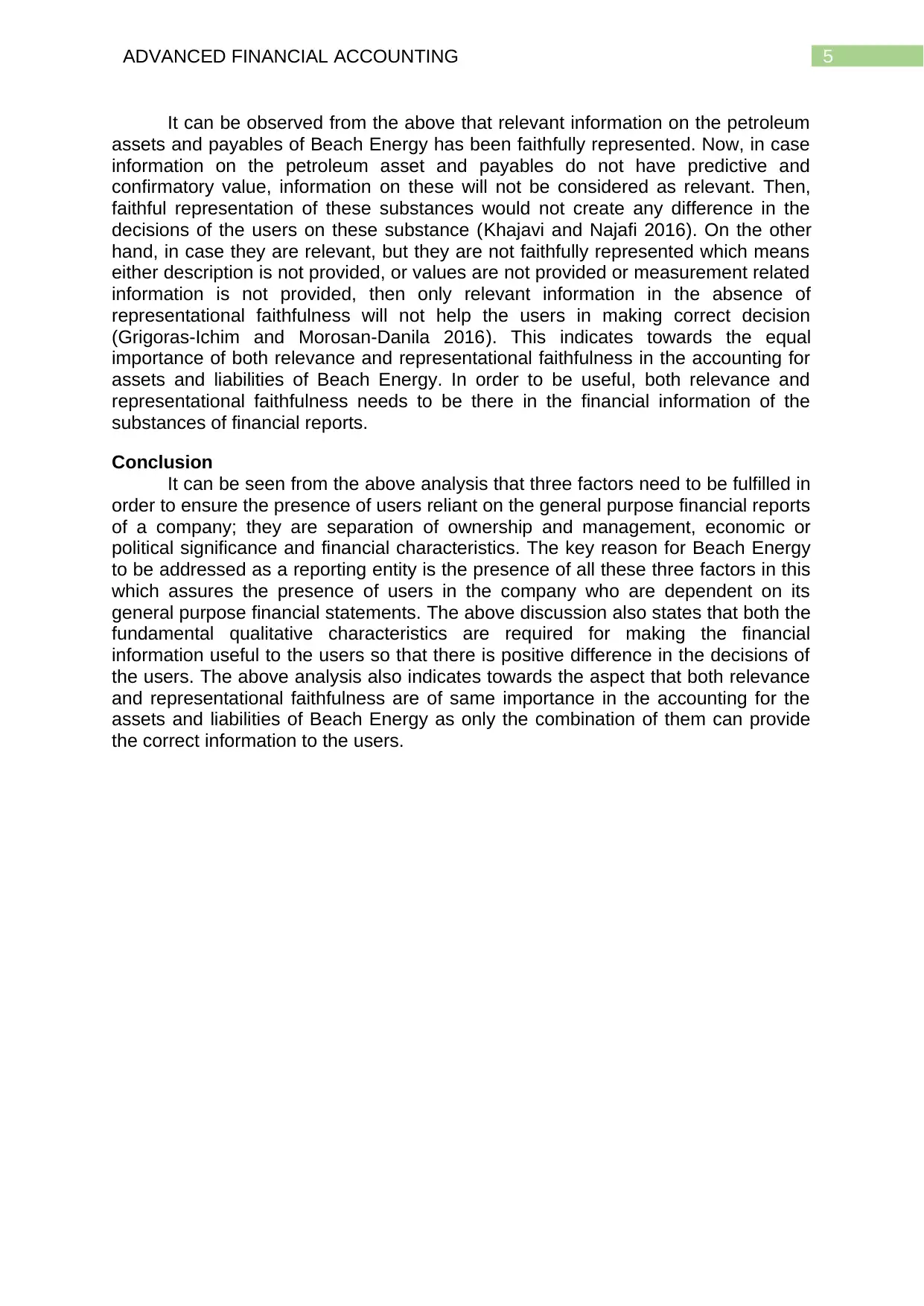
5ADVANCED FINANCIAL ACCOUNTING
It can be observed from the above that relevant information on the petroleum
assets and payables of Beach Energy has been faithfully represented. Now, in case
information on the petroleum asset and payables do not have predictive and
confirmatory value, information on these will not be considered as relevant. Then,
faithful representation of these substances would not create any difference in the
decisions of the users on these substance (Khajavi and Najafi 2016). On the other
hand, in case they are relevant, but they are not faithfully represented which means
either description is not provided, or values are not provided or measurement related
information is not provided, then only relevant information in the absence of
representational faithfulness will not help the users in making correct decision
(Grigoras-Ichim and Morosan-Danila 2016). This indicates towards the equal
importance of both relevance and representational faithfulness in the accounting for
assets and liabilities of Beach Energy. In order to be useful, both relevance and
representational faithfulness needs to be there in the financial information of the
substances of financial reports.
Conclusion
It can be seen from the above analysis that three factors need to be fulfilled in
order to ensure the presence of users reliant on the general purpose financial reports
of a company; they are separation of ownership and management, economic or
political significance and financial characteristics. The key reason for Beach Energy
to be addressed as a reporting entity is the presence of all these three factors in this
which assures the presence of users in the company who are dependent on its
general purpose financial statements. The above discussion also states that both the
fundamental qualitative characteristics are required for making the financial
information useful to the users so that there is positive difference in the decisions of
the users. The above analysis also indicates towards the aspect that both relevance
and representational faithfulness are of same importance in the accounting for the
assets and liabilities of Beach Energy as only the combination of them can provide
the correct information to the users.
It can be observed from the above that relevant information on the petroleum
assets and payables of Beach Energy has been faithfully represented. Now, in case
information on the petroleum asset and payables do not have predictive and
confirmatory value, information on these will not be considered as relevant. Then,
faithful representation of these substances would not create any difference in the
decisions of the users on these substance (Khajavi and Najafi 2016). On the other
hand, in case they are relevant, but they are not faithfully represented which means
either description is not provided, or values are not provided or measurement related
information is not provided, then only relevant information in the absence of
representational faithfulness will not help the users in making correct decision
(Grigoras-Ichim and Morosan-Danila 2016). This indicates towards the equal
importance of both relevance and representational faithfulness in the accounting for
assets and liabilities of Beach Energy. In order to be useful, both relevance and
representational faithfulness needs to be there in the financial information of the
substances of financial reports.
Conclusion
It can be seen from the above analysis that three factors need to be fulfilled in
order to ensure the presence of users reliant on the general purpose financial reports
of a company; they are separation of ownership and management, economic or
political significance and financial characteristics. The key reason for Beach Energy
to be addressed as a reporting entity is the presence of all these three factors in this
which assures the presence of users in the company who are dependent on its
general purpose financial statements. The above discussion also states that both the
fundamental qualitative characteristics are required for making the financial
information useful to the users so that there is positive difference in the decisions of
the users. The above analysis also indicates towards the aspect that both relevance
and representational faithfulness are of same importance in the accounting for the
assets and liabilities of Beach Energy as only the combination of them can provide
the correct information to the users.
⊘ This is a preview!⊘
Do you want full access?
Subscribe today to unlock all pages.

Trusted by 1+ million students worldwide
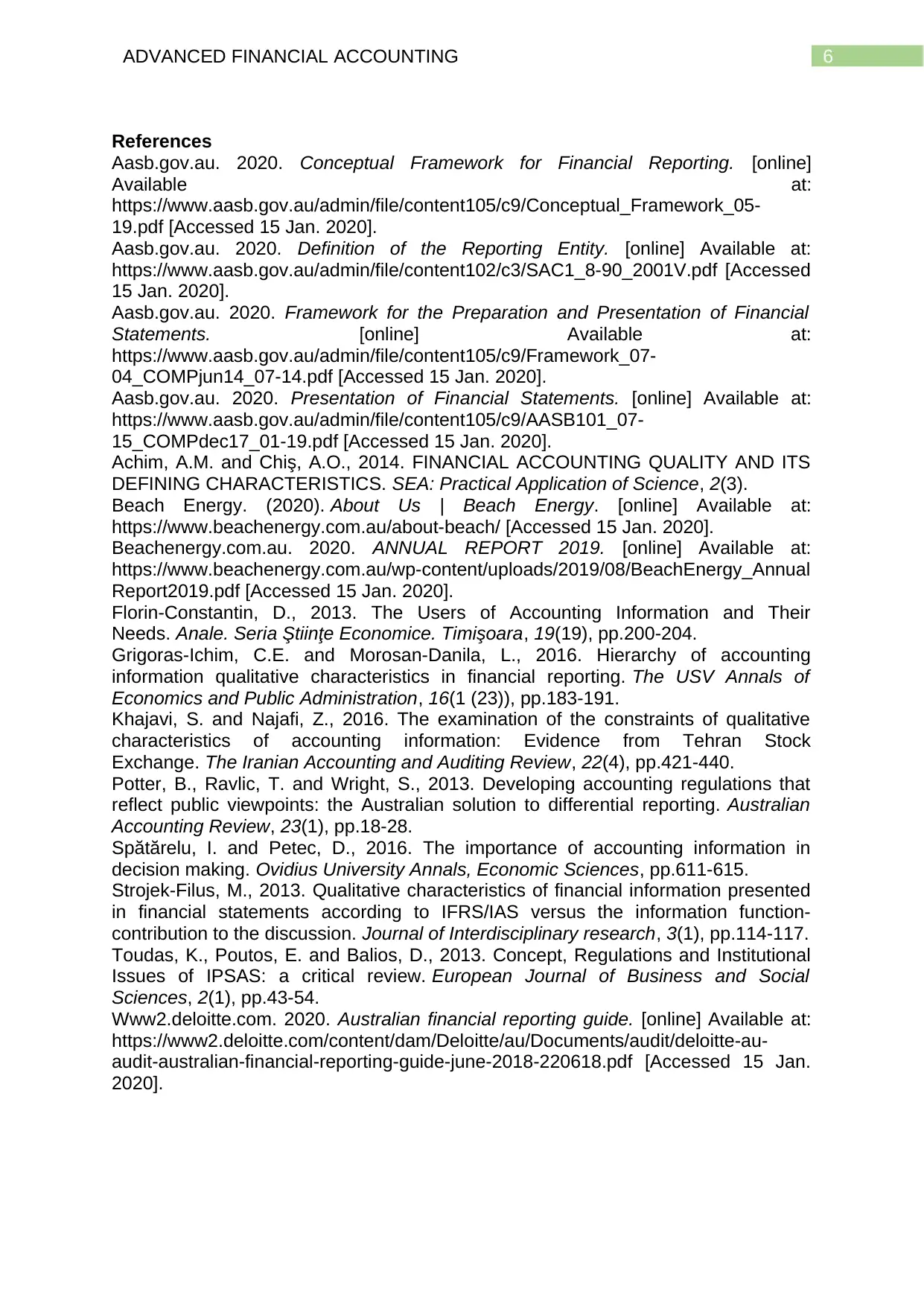
6ADVANCED FINANCIAL ACCOUNTING
References
Aasb.gov.au. 2020. Conceptual Framework for Financial Reporting. [online]
Available at:
https://www.aasb.gov.au/admin/file/content105/c9/Conceptual_Framework_05-
19.pdf [Accessed 15 Jan. 2020].
Aasb.gov.au. 2020. Definition of the Reporting Entity. [online] Available at:
https://www.aasb.gov.au/admin/file/content102/c3/SAC1_8-90_2001V.pdf [Accessed
15 Jan. 2020].
Aasb.gov.au. 2020. Framework for the Preparation and Presentation of Financial
Statements. [online] Available at:
https://www.aasb.gov.au/admin/file/content105/c9/Framework_07-
04_COMPjun14_07-14.pdf [Accessed 15 Jan. 2020].
Aasb.gov.au. 2020. Presentation of Financial Statements. [online] Available at:
https://www.aasb.gov.au/admin/file/content105/c9/AASB101_07-
15_COMPdec17_01-19.pdf [Accessed 15 Jan. 2020].
Achim, A.M. and Chiş, A.O., 2014. FINANCIAL ACCOUNTING QUALITY AND ITS
DEFINING CHARACTERISTICS. SEA: Practical Application of Science, 2(3).
Beach Energy. (2020). About Us | Beach Energy. [online] Available at:
https://www.beachenergy.com.au/about-beach/ [Accessed 15 Jan. 2020].
Beachenergy.com.au. 2020. ANNUAL REPORT 2019. [online] Available at:
https://www.beachenergy.com.au/wp-content/uploads/2019/08/BeachEnergy_Annual
Report2019.pdf [Accessed 15 Jan. 2020].
Florin-Constantin, D., 2013. The Users of Accounting Information and Their
Needs. Anale. Seria Ştiinţe Economice. Timişoara, 19(19), pp.200-204.
Grigoras-Ichim, C.E. and Morosan-Danila, L., 2016. Hierarchy of accounting
information qualitative characteristics in financial reporting. The USV Annals of
Economics and Public Administration, 16(1 (23)), pp.183-191.
Khajavi, S. and Najafi, Z., 2016. The examination of the constraints of qualitative
characteristics of accounting information: Evidence from Tehran Stock
Exchange. The Iranian Accounting and Auditing Review, 22(4), pp.421-440.
Potter, B., Ravlic, T. and Wright, S., 2013. Developing accounting regulations that
reflect public viewpoints: the Australian solution to differential reporting. Australian
Accounting Review, 23(1), pp.18-28.
Spătărelu, I. and Petec, D., 2016. The importance of accounting information in
decision making. Ovidius University Annals, Economic Sciences, pp.611-615.
Strojek-Filus, M., 2013. Qualitative characteristics of financial information presented
in financial statements according to IFRS/IAS versus the information function-
contribution to the discussion. Journal of Interdisciplinary research, 3(1), pp.114-117.
Toudas, K., Poutos, E. and Balios, D., 2013. Concept, Regulations and Institutional
Issues of IPSAS: a critical review. European Journal of Business and Social
Sciences, 2(1), pp.43-54.
Www2.deloitte.com. 2020. Australian financial reporting guide. [online] Available at:
https://www2.deloitte.com/content/dam/Deloitte/au/Documents/audit/deloitte-au-
audit-australian-financial-reporting-guide-june-2018-220618.pdf [Accessed 15 Jan.
2020].
References
Aasb.gov.au. 2020. Conceptual Framework for Financial Reporting. [online]
Available at:
https://www.aasb.gov.au/admin/file/content105/c9/Conceptual_Framework_05-
19.pdf [Accessed 15 Jan. 2020].
Aasb.gov.au. 2020. Definition of the Reporting Entity. [online] Available at:
https://www.aasb.gov.au/admin/file/content102/c3/SAC1_8-90_2001V.pdf [Accessed
15 Jan. 2020].
Aasb.gov.au. 2020. Framework for the Preparation and Presentation of Financial
Statements. [online] Available at:
https://www.aasb.gov.au/admin/file/content105/c9/Framework_07-
04_COMPjun14_07-14.pdf [Accessed 15 Jan. 2020].
Aasb.gov.au. 2020. Presentation of Financial Statements. [online] Available at:
https://www.aasb.gov.au/admin/file/content105/c9/AASB101_07-
15_COMPdec17_01-19.pdf [Accessed 15 Jan. 2020].
Achim, A.M. and Chiş, A.O., 2014. FINANCIAL ACCOUNTING QUALITY AND ITS
DEFINING CHARACTERISTICS. SEA: Practical Application of Science, 2(3).
Beach Energy. (2020). About Us | Beach Energy. [online] Available at:
https://www.beachenergy.com.au/about-beach/ [Accessed 15 Jan. 2020].
Beachenergy.com.au. 2020. ANNUAL REPORT 2019. [online] Available at:
https://www.beachenergy.com.au/wp-content/uploads/2019/08/BeachEnergy_Annual
Report2019.pdf [Accessed 15 Jan. 2020].
Florin-Constantin, D., 2013. The Users of Accounting Information and Their
Needs. Anale. Seria Ştiinţe Economice. Timişoara, 19(19), pp.200-204.
Grigoras-Ichim, C.E. and Morosan-Danila, L., 2016. Hierarchy of accounting
information qualitative characteristics in financial reporting. The USV Annals of
Economics and Public Administration, 16(1 (23)), pp.183-191.
Khajavi, S. and Najafi, Z., 2016. The examination of the constraints of qualitative
characteristics of accounting information: Evidence from Tehran Stock
Exchange. The Iranian Accounting and Auditing Review, 22(4), pp.421-440.
Potter, B., Ravlic, T. and Wright, S., 2013. Developing accounting regulations that
reflect public viewpoints: the Australian solution to differential reporting. Australian
Accounting Review, 23(1), pp.18-28.
Spătărelu, I. and Petec, D., 2016. The importance of accounting information in
decision making. Ovidius University Annals, Economic Sciences, pp.611-615.
Strojek-Filus, M., 2013. Qualitative characteristics of financial information presented
in financial statements according to IFRS/IAS versus the information function-
contribution to the discussion. Journal of Interdisciplinary research, 3(1), pp.114-117.
Toudas, K., Poutos, E. and Balios, D., 2013. Concept, Regulations and Institutional
Issues of IPSAS: a critical review. European Journal of Business and Social
Sciences, 2(1), pp.43-54.
Www2.deloitte.com. 2020. Australian financial reporting guide. [online] Available at:
https://www2.deloitte.com/content/dam/Deloitte/au/Documents/audit/deloitte-au-
audit-australian-financial-reporting-guide-june-2018-220618.pdf [Accessed 15 Jan.
2020].
1 out of 7
Related Documents
Your All-in-One AI-Powered Toolkit for Academic Success.
+13062052269
info@desklib.com
Available 24*7 on WhatsApp / Email
![[object Object]](/_next/static/media/star-bottom.7253800d.svg)
Unlock your academic potential
Copyright © 2020–2025 A2Z Services. All Rights Reserved. Developed and managed by ZUCOL.





